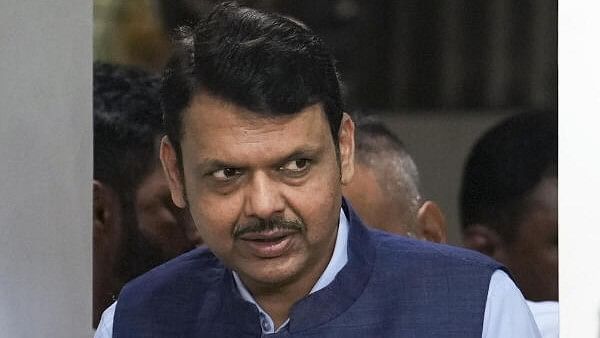
Deputy Chief Minister of Maharashtra and BJP leader Devendra Fadnavis
Credit: PTI Photo
‘Pee halad ani ho gori’, is a Marathi adage used for someone who wants to get desired results in a jiffy. This sums up the beleaguered Bharatiya Janata Party (BJP)-led ruling Maha Yuti’s attempts to turn the corner in Maharashtra.
With Assembly elections slated towards the end of this year, the Maha Yuti has rolled out the ‘Ladki Bahin’ yojana on the lines of the ‘Ladli Behna’ yojana in neighbouring Madhya Pradesh. ‘When in doubt, freebies are out’ seems to be the ruling alliance’s philosophy, which is seeking to create a vote bank among women to retain power after receiving a jolt in the Lok Sabha polls. The Prime Minister Narendra Modi- and Union Home Minister Amit Shah-led BJP central leadership seems to have followed in the footsteps of Union minister and former Madhya Pradesh Chief Minister Shivraj Singh Chouhan. The ‘Ladli Behna’ yojana worked wonders to shake off the Congress challenge in Madhya Pradesh.
The Ladki Bahin scheme announced in the state budget by Deputy Chief Minister Ajit Pawar is aimed at married, divorced, and destitute women in the age group 21 to 65, who will be entitled to a monthly assistance of Rs 1,500. It is part of the efforts of the BJP and its allies to set a new narrative amid complaints that the ruling alliance was the victim of a ‘fake narrative’ set by its detractors.
The scheme can be seen as a candid admission that Modi’s charisma or Hindutva may not help the BJP and its allies in the Assembly polls.
Now the BJP, the Shiv Sena-led by Chief Minister Eknath Shinde, and Ajit Pawar’s NCP have their back to the wall after winning just 17 out of the 48 Lok Sabha seats in the state. The Maha Vikas Aghadi (MVA) — consisting the Congress, NCP led by Sharad Pawar and Shiv Sena led by Uddhav Thackeray — won 30 seats. The remaining one seat went to a Congress rebel. In the 2019 general elections, the BJP-led NDA won 41 seats.
Undoubtedly, the scheme has created a buzz in the cities and the countryside with women thronging in large numbers to the government offices or the facilitation centres or following up the matter with the village talathis so much so that there are allegations of corruption in filling the forms. The irony here is that Modi who once dismissed such schemes as revadis (freebies) when resorted to by non-BJP parties in other states, has his party-led government introducing a populist scheme to attract women voters. The Maha Yuti is pinning much hope on the scheme and other such measures for various sections for which Rs 86,000 crores are being earmarked.
The Ladki Behin scheme unveils the growing deprivation in the premier state, hailed as the most industrialised in India and boasts of India’s financial headquarters Mumbai as its capital. The condition is worse in rural Maharashtra which has the dubious distinction of having the largest suicide by farmers. Despite being the most urbanised state, the lop-sided development is reflected in various ways. Mumbai, known as the city of dreams, is housing the largest number of billionaires in India and also has Asia’s biggest slums.
To project a united face, the Maha Yuti held a convention in Mumbai recently and declared that they aim to win 200 out of the 288 Assembly seats, a tall order given its performance in the Lok Sabha. Noting that there was only a gap of 2.5 million votes between the Maha Yuti and the MVA in the Lok Sabha polls, Deputy Chief Minister Devendra Fadnavis insisted that the challenge could be overcome by extra efforts in 200 seats.
The Maha Yuti is rumbling from within: there is an unending one-upmanship among the three partners to extract the maximum advantage to get the chief ministership, and the BJP is playing the big brother by being the dominant party. The RSS mouthpiece The Organiser had even suggested that the BJP get rid of the Ajit Pawar NCP sooner than later, and a section of the BJP feels that this NCP faction is the albatross around the Maha Yuti’s neck.
If the Maha Yuti was a more cohesive alliance its performance in the general elections would have been much better. Now, the real test for the ruling alliance would be the allocation of assembly seats among the three parties. As against this, the bugbear for Modi and his government is despite internal tussles and growing ambitions the MVA is fighting fit. The role of octogenarian Sharad Pawar as an anchor is also stabilising the opposition alliance.
It is to be seen how the Ladki Bahin scheme changes the fortunes of the BJP in Maharashtra, but it is a fact that women have become a loyal vote bank if issues of their concern were addressed in earnest.
(Sunil Gatade and Venkatesh Kesari are senior journalists.)
Disclaimer: The views expressed above are the author's own. They do not necessarily reflect the views of DH.